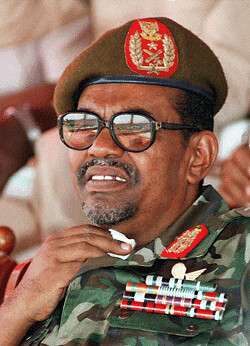
Sudan President Omar Hassan al-Bashir has gained the support from many African and Arab states in light of the International Criminal Court indictment against him. He has dismissed the charges as an imperialist plot to seize the oil wealth of Sudan., a photo by Pan-African News Wire File Photos on Flickr.
US and Sudan spar over humanitarian crisis
UNITED NATIONS (AP) — The United States warned Tuesday that a humanitarian crisis is worsening in two states in Sudan where clashes are taking place, but the Sudanese government insisted the situation is "99 percent" normal.
South Kordofan and Blue Nile border the newly independent nation of South Sudan, which seceded from Sudan in July.
Both Sudanese states contain large groups that sided with the south during more than two decades of civil war but remain part of the north. Rebels from those groups that still support South Sudan's ruling party want to topple the Khartoum government.
Fighting between the Sudanese army and the rebels started in June in South Kordofan and spread to neighboring Blue Nile in September, forcing some 417,000 people to flee their homes, with the majority remaining in the country but 80,000 seeking refuge in South Sudan and thousands more in Ethiopia, according to the U.N.
U.S. Ambassador Susan Rice accused Sudan's government of deliberately preventing U.N. agencies and aid groups from going to the conflict areas in the two states to help hundreds of thousands of civilians affected by the fighting.
"It is the United States government's firm belief that, if the government of Sudan does not allow immediate and meaningful humanitarian access to the conflict zones in Southern Kordofan and Blue Nile so life-saving humanitarian assistance can be provided to civilians in need, we will likely see famine conditions in parts of Sudan," Rice wrote in a letter to Security Council members.
According to the U.S. Agency for International Development, without immediate assistance the situation in the two states will reach Stage 4 of a humanitarian emergency in March, "which is one step short of full-scale famine," Rice said.
"We reiterate the call on the government of Sudan to allow full, immediate, unconditional access to all populations in Southern Kordofan and Blue Nile to avert what has the potential very soon to be a full-scale humanitarian crisis," she said.
Sudan's U.N. Ambassador Daffa-Alla Elhag Ali Osman countered that the government is cooperating with U.N. agencies to provide relief to all needy people in areas captured from the rebels by the Sudanese army. But he said the government doesn't care about humanitarian aid for the rebels.
"99 percent of the surface of the two states is normal, I assure you," he said. "There are a few pockets in the border area where the rebels are found. Maybe some members are concerned to feed the rebels, to sustain them and to ensure their social welfare or their military welfare. This is not the concern of the government of Sudan."
He said representatives of U.N. agencies might be allowed into unsafe areas, where remnants of the rebels are still operating, with government escorts to ensure that individuals working for those agencies don't cooperate with the rebels and provide vehicles or planes to transport weapons and ammunition, which he claimed happened in the past.
The U.S. and Sudanese ambassadors spoke to reporters after closed-door briefings to the Security Council by the U.N. humanitarian and refugee chiefs.
U.N. Undersecretary-General for Humanitarian Affairs Valerie Amos has expressed serious concern about the situation in Southern Kordofan and Blue Nile, saying earlier this month that the U.N. had received alarming reports of malnutrition in the two states. She has sought better access to Southern Kordofan and Blue Nile, where the U.N. has national staff in the capitals but no international staff.
No comments:
Post a Comment